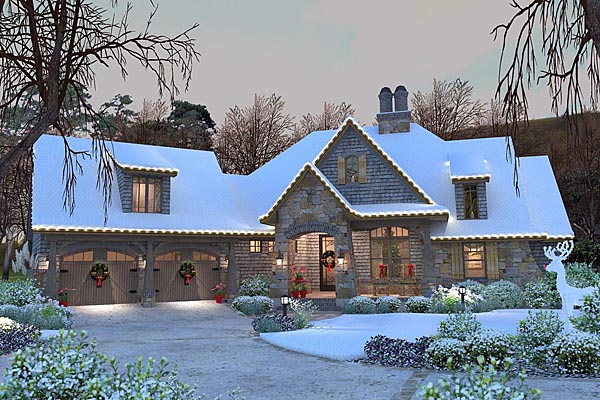Understanding Your House Plan License: What You Can and Can’t Do
When you purchase a house plan online, it may feel like you’ve just “bought” the design outright—something you now own like a piece of furniture or a car. But in reality, what you’re purchasing is a license to use the designer’s work, not ownership of the design itself. This distinction is important, because it affects what you can and can’t do with your plan.
Think of it like buying a song or a movie digitally. You have the right to play it, enjoy it, and share the experience with your family—but you don’t suddenly own the rights to redistribute it or claim it as your own creation. The same applies to house plans: the designer remains the copyright holder, while your purchase grants you a license to build.
What a House Plan License Typically Allows
The standard license you purchase from a site like Family Home Plans gives you permission to use the design to construct one home. That’s the key word: one. Whether you’re building your forever home on a mountain lot or a starter home in the suburbs, your license is specific to that single build.
Here’s what you can generally expect your license to allow:
- Building one home: You may use the plans to construct a single house for your personal use.
- Making modifications: Most designers allow you to make changes through a licensed professional (such as an architect or engineer). These changes are usually limited to adapting the design to your needs or local building codes.
- Providing copies to your builder and local officials: You can submit the necessary sets to your contractor, engineers, and permitting office. These copies exist to facilitate the building of your one licensed home.
- Resale of your built home: Once the home is built, you can sell it just like any other property. Your license covers the construction, not a lifetime restriction on resale.
In short, the license gives you the right to bring a designer’s vision to life once—and to enjoy that home for as long as you wish.
What a House Plan License Does Not Allow
Because the designer retains copyright over the plans, there are important restrictions that protect their creative work. These limitations are often misunderstood by first-time plan buyers:
- No unlimited builds (without special license): A standard purchase does not let you build the same plan multiple times, even on different lots you own.
- No resale of plans: You cannot resell, gift, or share the digital files with others for them to build their own homes.
- No claiming authorship: You may not present the plans as your own design, publish them as original work, or use them in commercial projects without permission.
- No unrestricted modifications: While you can make changes, you cannot strip away copyright and treat the modified plan as your own original design. The designer’s rights remain intact.
Violating these terms is not just unfair to the designer—it can also carry legal consequences, since house plans are protected by U.S. copyright law.
Options Beyond the Standard License
For most homeowners, the single-build license is exactly what they need. But what if you’re a builder or developer who wants to construct the same plan multiple times? Or maybe you want the flexibility of reusing a favorite plan on future projects? That’s where additional license options come in.
Additional Build Licenses
Many designers offer the option to purchase an additional build license. This extends your original license to allow for a second build (or more). For example, if you fall in love with a cottage plan and want to use it for a second vacation property, you can purchase an add-on license at a reduced cost rather than buying the plan from scratch again.
Unlimited Build Licenses
For professional builders, an unlimited build license is often the best investment. This license allows you to construct the same home design as many times as you’d like, making it a powerful tool for developers building neighborhoods or repeat models.
While more expensive upfront, an unlimited license pays off quickly if you plan to use the design repeatedly. It also ensures you stay fully compliant with copyright law while enjoying the efficiency of a tested, appealing design.
Why Designers Use a License System
House plans are intellectual property. Just as a novel belongs to its author or a song to its composer, a floor plan belongs to the designer. By using a licensing model, designers can protect their creative work while still making it accessible and affordable to thousands of homeowners.
This system also ensures fairness. A designer who spends months crafting a versatile, buildable plan should receive compensation each time that design is used. For homeowners, it means you’re benefiting from professional expertise without the high cost of hiring a custom architect from scratch.
How to Know Which License You Need
If you’re buying a plan for your personal residence, a single-build license is usually the right choice. If you’re planning multiple builds, ask about additional build licenses or consider investing in an unlimited license if you’re a builder or developer.
When browsing plans on Family Home Plans, check the details provided for each design. Our customer service team can also help clarify your options to make sure you choose the license that fits your needs.
Final Thoughts
Buying a house plan isn’t just a purchase—it’s a partnership between homeowner and designer. You gain the ability to bring a vision to life, while respecting the creative rights of the person who designed it. By understanding the terms of your house plan license, you can move forward confidently, knowing exactly what you’re allowed to do—and how to expand your rights if your goals change.
Whether you need a single-build license for your dream home or an unlimited license for multiple projects, Family Home Plans provides clear options that balance creativity, legality, and affordability.
👉 Browse our house plans today and choose the license that’s right for you.











Leave a Reply